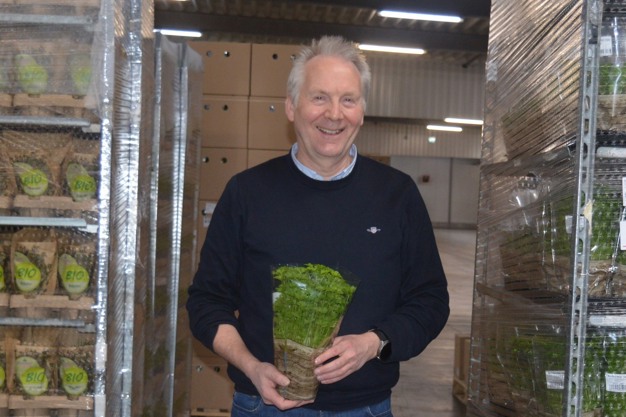Due to weather fluctuations, inflationary cost increases, and the growing volume and price pressure from abroad, the German greenhouse cultivation sector is increasingly under pressure. Accordingly, the cooperative model that has proven itself over decades, as well as well-considered, joint investments in new cultivation cultures and technology, are now more important than ever, comments Andreas Brinker, Sales Manager at Gartenbauzentrale Papenburg eG. FreshPlaza.de made its way to the far north for a discussion about the status quo and the future perspective of Germany's northernmost cooperative.
Here you can find the photos of our visit.
Despite the fluctuating weather and slightly below-average yields, Gartenbauzentrale looks back on a solid business year 2023. "One must not compare 2023 with the previous year 2022, in which we had high light levels and accordingly lush yields. Overall, supply and demand were quite in balance last year, and the volumes flowed off quite well. One of our focuses within the cooperative is to produce according to demand and to market our production volumes sensibly," Brinker emphasizes.

Andreas Brinker has been working at Gartenbauzentrale for 30 years now and as a sales manager, he is the main contact for both the cooperative members and the buyers of the food retail trade. He is responsible for the sales of the vegetables produced cooperatively on a total of 110 hectares. The fact that food safety, meaning quality management and residue analysis, is considered a basic requirement today, according to Brinker, is one of the biggest, positive changes during his career.
Bumpy start to the 2024 season
Due to the energy crisis, planting dates last year were significantly postponed. However, this year we are back on regular schedule, says Brinker. Nevertheless, the predominantly dark, rainy weather also leads to a bumpy start to the season this year. "Normally, we start from week 16 with larger quantities of greenhouse vegetables, but we are now about two to three weeks behind and only expect full yields of tomatoes and peppers by weeks 18-19." The cucumber harvest traditionally begins in March. "This year, prices have so far been about 20 percent below the average level."
Due to its history, the region around Papenburg in the northern Emsland has a long tradition in commercial horticulture. With 44 members and a total of around 110 hectares of greenhouse space, the cooperative continues to be one of the main suppliers to the German and partly European food retail trade. "About half of our harvest volume is made up of greenhouse vegetables, namely cucumbers, peppers, and tomatoes. Thanks to the latest addition to our range of snack cucumbers, we can now offer the entire spectrum of varieties, where we continue to be the largest producer of salad cucumbers in Germany. What also sets us apart is that most producers are located within a 10km radius in and around Papenburg."
In addition to cucumbers, the year-round cultivation and export of potted herbs also play a significant role in the cooperative. It's no coincidence that Papenburg has been considered the herb capital of Europe for many years. Brinker: "Although there are always new, unusual herb varieties, the classics, basil, parsley, chives, mint, and rosemary, continue to lead in the kitchen and thus in our production. We deliberately focus on organic herbs, whether Naturland, Bioland, or Demeter, which make up over 90 percent of our production. We have found that the price gap between conventional and organic in herbs is much narrower compared to many other organic items." Furthermore, Brinker points out that the Papenburg growers have been increasingly focusing on sustainable PCR herb pots made from recycled material for several years.
Automation and innovation
To contain costs to a reasonable extent and to remain competitive in the future, the cooperative is open to new technologies, such as automation, Brinker continues. "In the area of packaging and processing, quite a bit is already being tested, whereas the work of harvesting is more difficult to automate. Furthermore, some gardeners are ready to implement new topics such as vertical farming and hydroponics." Here too, the cooperative model is advantageous, according to Brinker, since the horticultural businesses do not experiment individually, but actively exchange ideas and experiences.
More information:
Andreas Brinker
Gartenbauzentrale eG
Schulze-Delitzsch-Str. 10
26871 Papenburg
Tel.: +49 4961 801 551
Fax: +49 4961 801 909
[email protected]
www.gartenbauzentrale.de
